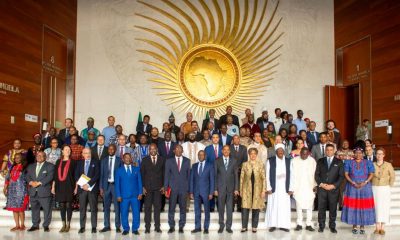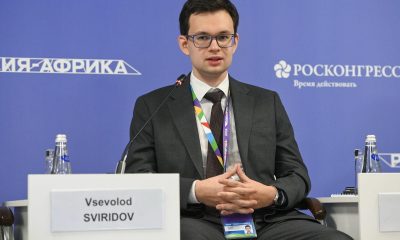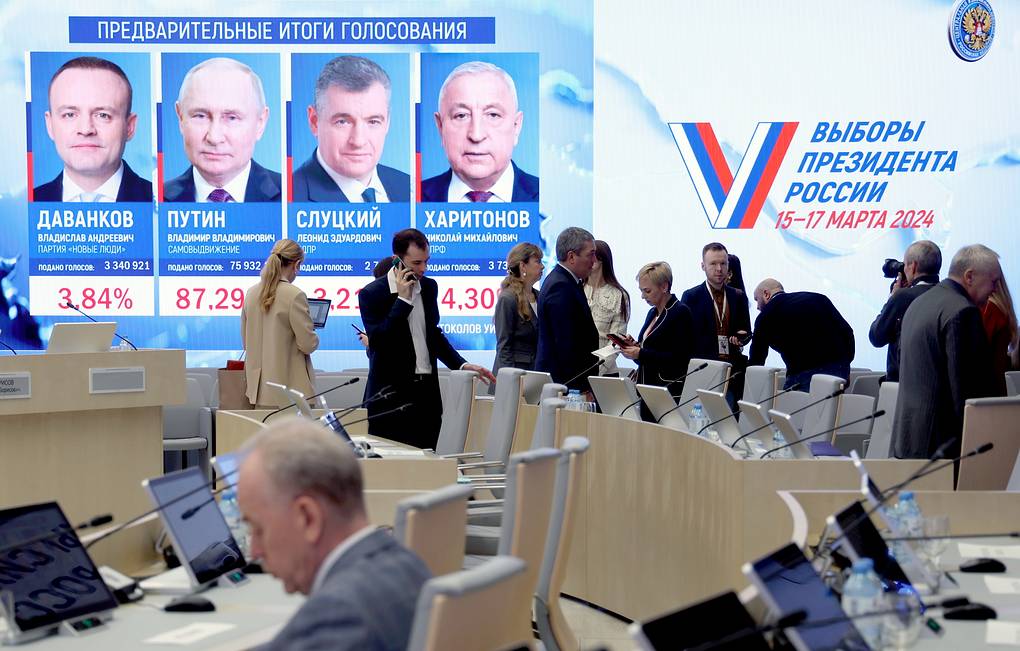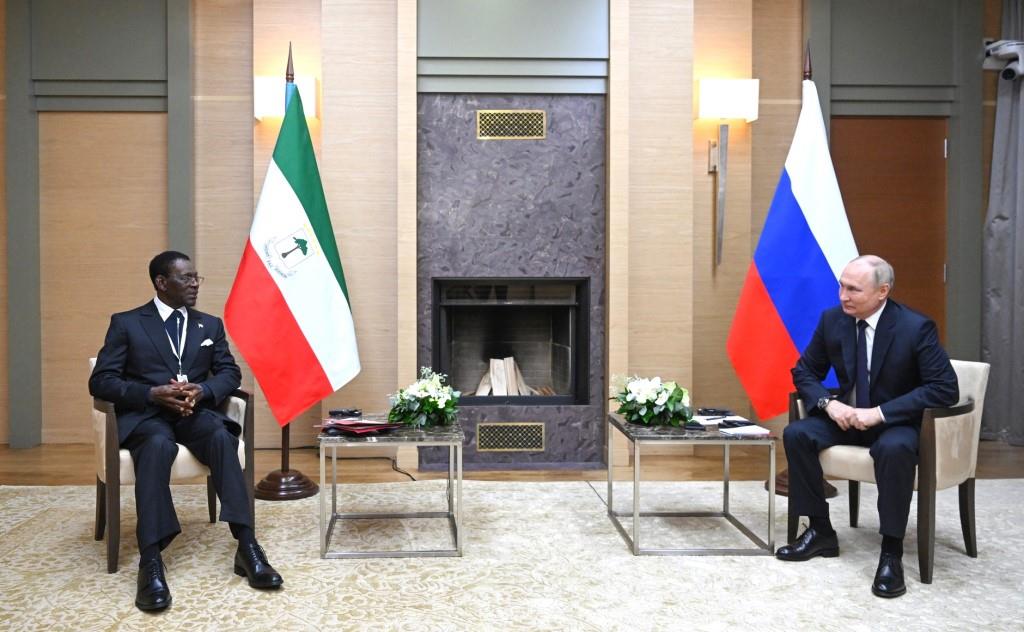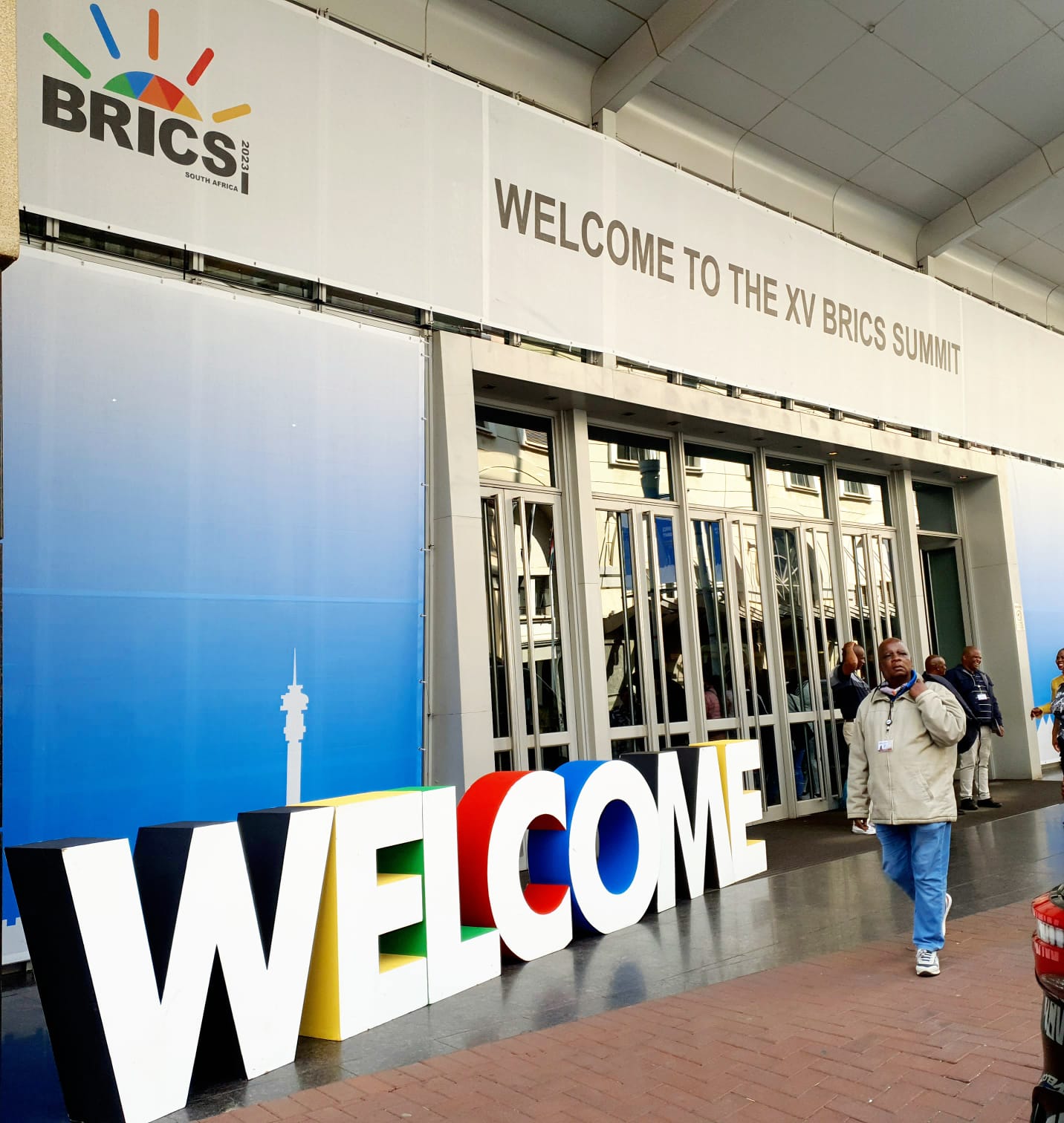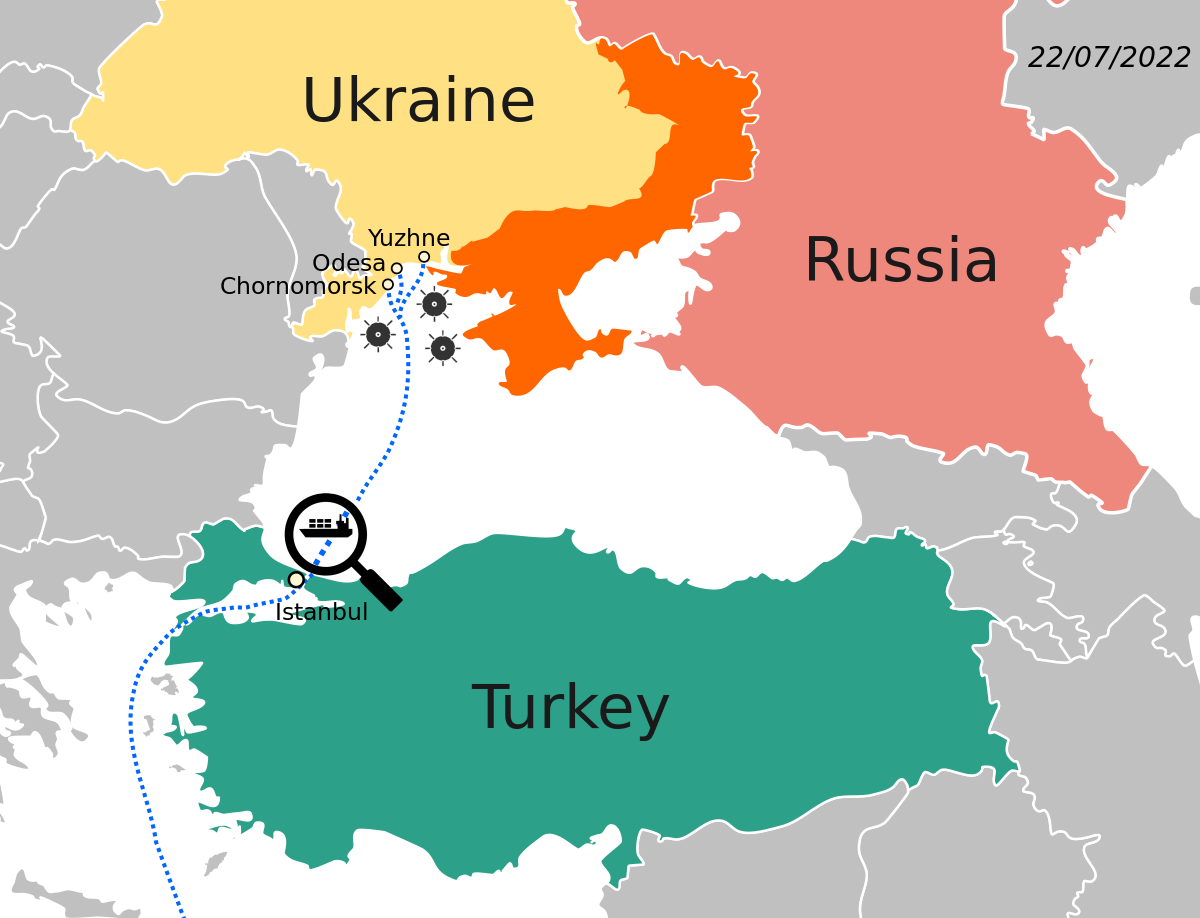World
Mandela’s Heirs Lose Power in South Africa
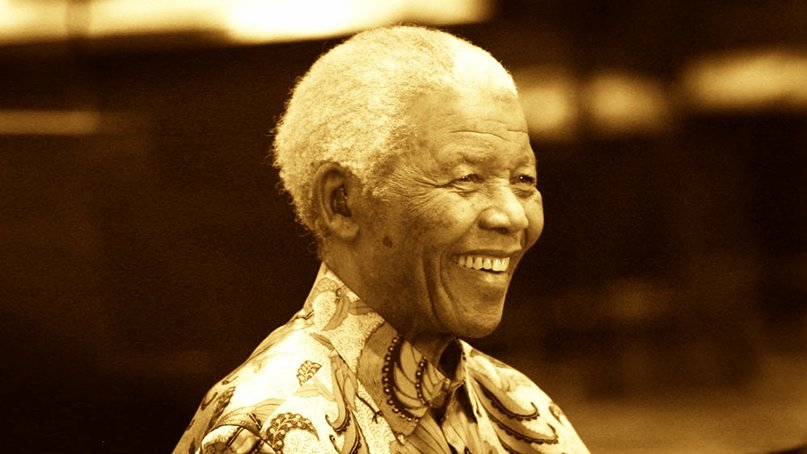
By Alexander Braterskiy
South African authorities warn that if the opposition wins the parliamentary elections, the country may change course and leave the informal BRICS economic bloc, which includes Russia. The position of the African National Congress party, which has been in power since the collapse of apartheid, is indeed not the best, as shown by the municipal elections held earlier in the country. The opposition accuses the president of corruption and abuse of power, as well as an inability to cope with the country’s energy crisis. The ANC crisis occurred on the 30th anniversary of the first free elections in South Africa.
South African Ambassador to Russia Mzuvukile Jeff Maketuka believes that if the opposition wins the parliamentary elections this year, the country may leave the BRICS association. “If the official opposition wins the election, there will be a change in South Africa’s foreign policy position. There is a high probability that if this happens, South Africa will be withdrawn from BRICS,” the ambassador said in a recent interview with TASS.
Considering that the ambassador does not express his point of view, but expresses the position of the state, these words can be taken quite seriously. The ambassador even cited the example of Argentina, which, after the victory of populist Javier Millay in the elections, refused to join BRICS. However, if Argentina was just about to become a member of an informal but influential organization, then South Africa is a country that can be called one of the “founding fathers” of BRICS.
Elections in South Africa, which will be held at the end of May, could become a turning point for the country due to the possible loss of power of the ruling African National Congress (ANC) party. “The African National Congress, of course, played its rightful role during apartheid and secured the political independence of South Africa. Thereafter, it continued to play a huge role after independence in nation-building and economic development. But from the days of Jacob Zuma to Cyril Ramaphosa, the ANC became deeply corrupt, signing opaque deals with outside players. There are serious doubts about the integrity of the ANC. This is opportunism at its worst, not the human rights they fight for. In essence, the ANC’s policy is focused on the global trend – business deals for money,” African publicist Kester Kenn Klomegah tells Finam.ru.
It is symbolic that, simultaneously with the elections, the country will mark 30 years since the collapse of the apartheid system, a rigid authoritarian system of rule by the white minority. The long-standing policy was associated with a system of racial discrimination in which members of the African population were considered second-class citizens.
“The Pretoria regime guards the interests of imperialism in Africa” – this phrase from the Soviet magazine “International Affairs” in 1985 is familiar to almost everyone who grew up in the USSR. At the same time, it must be said that in terms of attitude towards apartheid, the USSR was on the right side of history, unlike many Western countries that sold weapons to this country despite international sanctions. The USSR also actively contributed to the establishment of democracy in South Africa. The former head of TASS, Vitaly Ignatenko, recalls how he handed over a letter from South African President Frederik de Klerk to the head of the Soviet Foreign Ministry, Eduard Shevardnadze. The country’s authorities were looking for opportunities to establish relations with the USSR on the wave of democratization.
The head of the then-white minority regime, de Klerk, began “democratization from above” in the country. He was released from prison by the main enemy of the regime, Nelson Mandela, who had spent more than 26 years in prison. Mandela’s release marked the beginning of the end of apartheid: in 1994, the country held its first free elections, in which the ANC won a majority. The former opponents came to reconciliation through a special commission, at which members of the former regime asked for forgiveness from the victims. In 1994, Mandela was elected president of the country, leaving office in 1999.
Breach of contract
However, the euphoria of the first years of democratization and economic growth has passed. As economist Timothy Taylor writes on his Conversable Economist blog, the 1994 changes “created few winners.” “In this view, South Africa’s democracy was built on the simple assumption that a growing black elite and middle class could compromise with anyone, provided that each generation of black South Africans did better than the last,” the author writes.
All this continued for the first 15 years, and although “inequality remained enormous, the bottom quarter of the population was able to rise through the expansion of the welfare state. However, after the global crisis of 2008, the era of state capture under former President Jacob Zuma and COVID, this “founding treaty” was broken.”
According to the IMF, South Africa’s economy grew by 0.4% in 2023. The fund’s economists also note that one of the country’s main problems is the increased level of public debt, one of the highest among developing countries. As IMF experts write, it “limits the government’s ability to respond to shocks and meet growing social and development needs. Stabilizing the country’s debt and making room in the budget for targeted social spending and public investment will require cuts to the government’s wage bill and transfers to state-owned enterprises.”
The situation is also reflected in the purchasing power of South Africans. 44% of consumers spent less during the holiday season than the previous year, largely due to lower income, and only 30% spent more than they did in 2022, according to a Citibank survey.
Return to the same problems
The ANC party, which came to power after the fall of apartheid, still has a majority in parliament, but 30 years later its position is not the best. “The 2024 elections in South Africa may become a turning point in its history,” note the Institute of African Studies of the Russian Academy of Sciences and remind that according to the results of municipal elections in 2021, the number of votes cast for the party decreased to 45.6%.
According to an October 2023 poll by the Social Research Foundation (SRF), only 45% of voters would vote for the ANC if elections were held tomorrow, down from 52% in March.
The sympathies of many South African voters are on the side of the opposition Democratic Alliance party, which takes liberal positions in contrast to the left-wing ANC. Its leader is white, South African citizen John Steenhuisen, but black politicians also occupy high positions in the party. The party is critical of Russia’s Northern Military District in Ukraine. During the upcoming visit of Russian President Vladimir Putin in the summer of 2023, the party appealed to the South African court demanding the execution of the decision of the International Criminal Court. Earlier, the ICC issued an arrest warrant for Putin and the Ombudsman for Children’s Rights Maria Lvova-Belova because they were allegedly involved in the illegal removal of Ukrainian children. As the South African Ambassador to Russia, Maketuka, noted in an interview with TASS, “the main opposition party is not a friend of Russia.”
Citizens of South Africa, 30 years later, are concerned about the same problems as before: inequality, poverty, unemployment, which has grown significantly among young Africans. According to government data cited by the Associated Press, unemployment covers more than 33% of the country’s residents. Among young people, the unemployment rate is 61%. Because of the current situation, many of the older generations even yearn for the times of apartheid, when they lived, albeit in fear, but with a roof over their heads.
However, there are still improvements in South Africa, writes Bloomberg, noting a drop in the unemployment rate to the lowest level since 2021. However, economists warn that this effect could fade as electricity supply problems worsen.
“Power outages, volatile commodity prices and challenging external conditions have contributed to the country’s weak economic growth performance,” the IMF report said.
The problem with the shortage of electricity in the country has been around for a long time – many substations have fallen into disrepair, they are more than 50 years old, and the available generating capacity is declining. The national energy company is forced to limit the supply of electricity to avoid a collapse. The country’s central bank says power woes cost the economy $13 billion in 2023 alone. Significant investments are needed to improve the situation.
Hope is pinned on China, which is actively represented in such sectors of the country’s economy as mining, telecommunications, and electronics manufacturing. According to government data, the total level of Chinese investment in the South African economy amounted to 200 billion rand, more than $10 billion.
The potential of South Africa also promises opportunities for Russian business, but so far there are few large Russian projects in this country. However, South Africa sees opportunities to strengthen cooperation with Russia against the backdrop of weakening ties between Moscow and the “collective West.” Moreover, among South Africa’s largest trading partners, besides China, are countries such as the USA, Germany, and the UK. A multi-vector policy for developing economic ties with the whole world, and albeit sometimes creakingly, but working democratic institutions, is also a legacy of the victory over apartheid and a reflection of Mandela’s words, which, however, were only partially realized. “Throughout my life, I have devoted myself entirely to the struggle for the African population. I fought against both white supremacy and black supremacy. I revered the ideal of a democratic and free society in which all citizens live in harmony and have equal opportunity.”
This article first appeared in Finam media and was reposted with the author’s permission.
World
African Visual Art is Distinguished by Colour Expression, Dynamic Form—Kalalb

By Kestér Kenn Klomegâh
In this insightful interview, Natali Kalalb, founder of NAtali KAlalb Art Gallery, discusses her practical experiences of handling Africa’s contemporary arts, her professional journey into the creative industry and entrepreneurship, and also strategies of building cultural partnership as a foundation for Russian-African bilateral relations. Here are the interview excerpts:
Given your experience working with Africa, particularly in promoting contemporary art, how would you assess its impact on Russian-African relations?
Interestingly, my professional journey in Africa began with the work “Afroprima.” It depicted a dark-skinned ballerina, combining African dance and the Russian academic ballet tradition. This painting became a symbol of cultural synthesis—not opposition, but dialogue.
Contemporary African art is rapidly strengthening its place in the world. By 2017, the market was growing so rapidly that Sotheby launched its first separate African auction, bringing together 100 lots from 60 artists from 14 foreign countries, including Algeria, Ghana, Mali, Nigeria, Senegal, and others. That same year during the Autumn season, Louis Vuitton Foundation in Paris hosted a major exhibition dedicated to African art. According to Artnet, sales of contemporary African artists reached $40 million by 2021, a 434% increase in just two years. Today, Sotheby holds African auctions twice a year, and in October 2023, they raised $2.8 million.
In Russia, this process manifests itself through cultural dialogue: exhibitions, studios, and educational initiatives create a space of trust and mutual respect, shaping the understanding of contemporary African art at the local level.
Do you think geopolitical changes are affecting your professional work? What prompted you to create an African art studio?
The international context certainly influences cultural processes. However, my decision to work with African themes was not situational. I was drawn to the expressiveness of African visual language—colour, rhythm, and plastic energy. This theme is practically not represented systematically and professionally in the Russian art scene.
The creation of the studio was a step toward establishing a sustainable platform for cultural exchange and artistic dialogue, where the works of African artists are perceived as a full-fledged part of the global cultural process, rather than an exotic one.
To what extent does African art influence Russian perceptions?
Contemporary African art is gradually changing the perception of the continent. While previously viewed superficially or stereotypically, today viewers are confronted with the depth of artistic expression and the intellectual and aesthetic level of contemporary artists.
Portraits are particularly impactful: they allow us to see not just an abstract image of a “continent,” but a concrete personality, character, and inner dignity. Global market growth data and regular auctions create additional trust in African contemporary art and contribute to its perception as a mature and valuable movement.
Does African art reflect lifestyle and fashion? How does it differ from Russian art?
African art, in my opinion, is at its peak in everyday culture—textiles, ornamentation, bodily movement, rhythm. It interacts organically with fashion, music, interior design, and the urban environment. The Russian artistic tradition is historically more academic and philosophical. African visual art is distinguished by greater colour expression and dynamic form. Nevertheless, both cultures are united by a profound symbolic and spiritual component.
What feedback do you receive on social media?
Audience reactions are generally constructive and engaging. Viewers ask questions about cultural codes, symbolism, and the choice of subjects. The digital environment allows for a diversity of opinions, but a conscious interest and a willingness to engage in cultural dialogue are emerging.
What are the key challenges and achievements of recent years?
Key challenges:
- Limited expert base on African contemporary art in Russia;
- Need for systematic educational outreach;
- Overcoming the perception of African art as exclusively decorative or ethnic.
Key achievements:
- Building a sustainable audience;
- Implementing exhibition and studio projects;
- Strengthening professional cultural interaction and trust in African
contemporary art as a serious artistic movement.
What are your future prospects in the context of cultural diplomacy?
Looking forward, I see the development of joint exhibitions, educational programs, and creative residencies. Cultural diplomacy is a long-term process based on respect and professionalism. If an artistic image is capable of uniting different cultural traditions in a single visual space, it becomes a tool for mutual understanding.
World
Ukraine Reveals Identities of Nigerians Killed Fighting for Russia

By Adedapo Adesanya
The Ukrainian Defence Intelligence (UDI) has identified two Nigerian men, Mr Hamzat Kazeem Kolawole and Mr Mbah Stephen Udoka, allegedly killed while fighting as Russian mercenaries in the war between the two countries ongoing since February 2022.
The development comes after Russia denied knowledge of Nigerians being recruited to fight on the frontlines.
Earlier this week, the Russian Ambassador to Nigeria, Mr Andrey Podyolyshev, said in Abuja that he was not aware of any government-backed programme to recruit Nigerians to fight in the war in Ukraine.
He said if at all such activity existed, it is not connected with the Russian state.
However, in a statement on Thursday, the Ukrainian Defence released photographs of Nigerians killed while defending Russia.
“In the Luhansk region, military intelligence operatives discovered the bodies of two citizens of the Federal Republic of Nigeria — Hamzat Kazeen Kolawole (03.04.1983) and Mbah Stephen Udoka (07.01.1988),” the statement read.
According to the statement, both men served in the 423rd Guards Motor Rifle Regiment (military unit 91701) of the 4th Guards Kantemirovskaya Tank Division of the armed forces of the Russian Federation.
UDI said that they signed contracts with the Russian Army in the second half of 2025 – the deceased Mr Kolawole on August 29 and Mr Udoka on September 28.
“Udoka received no training whatsoever — just five days later, on October 3, he was assigned to the unit and sent to the temporarily occupied territories of Ukraine,” the report read.
It added that no training records for Mr Kolawole have been preserved; however, it is highly likely that he also received no military training, but his wife and three children remain in Nigeria.
Both Nigerians, the report added, were killed in late November during an attempt to storm Ukrainian positions in the Luhansk region.
“They never engaged in a firefight — the mercenaries were eliminated by a drone strike,” UDI stated, warning foreign citizens against travelling to the Russian Federation or taking up any work on the territory of the “aggressor state”.
“A trip to Russia is a real risk of being forced into a suicide assault unit and, ultimately, rotting in Ukrainian soil,” the statement read.
In an investigation earlier this month, CNN reported that hundreds of African men have been enticed to fight for Russia in Ukraine with the promise of civilian jobs and high salaries. However, the media organisation uncovered that they are being deceived or sent to the front lines with little combat training.
CNN said it reviewed hundreds of chats on messaging apps, military contracts, visas, flights and hotel bookings, as well as gathering first-hand accounts from African fighters in Ukraine, to understand just how Russia entices African men to bolster its ranks.
World
Today’s Generation of Entrepreneurs Value Flexibility, Autonomy—McNeal-Weary

By Kestér Kenn Klomegâh
The Young African Leaders Initiative (YALI) is the United States’ signature step to invest in the next generation of African leaders. Since its establishment in 2010 by Obama administration, YALI has offered diverse opportunities, including academic training in leadership, governance skills, organizational development and entrepreneurship, and has connected with thousands of young leaders across Africa. This United States’ policy collaboration benefits both America and Africa by creating stronger partnerships, enhancing mutual prosperity, and ensuring a more stable environment.
In our conversation, Tonya McNeal-Weary, Managing Director at IBS Global Consulting, Inc., Global Headquarters in Detroit, Michigan, has endeavored to discuss, thoroughly, today’s generation of entrepreneurs and also building partnerships as a foundation for driving positive change and innovation in the global marketplace. Here are the excerpts of her conversation:
How would you describe today’s generation of entrepreneurs?
I would describe today’s generation of entrepreneurs as having a digital-first mindset and a fundamental belief that business success and social impact can coexist. Unlike the entrepreneurs before them, they’ve grown up with the internet as a given, enabling them to build global businesses from their laptops and think beyond geographic constraints from day one. They value flexibility and autonomy, often rejecting traditional corporate ladders in favor of building something meaningful on their own terms, even if it means embracing uncertainty and financial risk that previous generations might have avoided.
And those representing the Young African Leaders Initiative, who attended your webinar presentation late January 2026?
The entrepreneurs representing the Young African Leaders Initiative are redefining entrepreneurship on the continent by leveraging their unique perspectives, cultural heritage, and experiences. Their ability to innovate within local contexts while connecting to global opportunities exemplifies how the new wave of entrepreneurs is not confined by geography or conventional expectations.
What were the main issues that formed your ‘lecture’ with them, Young African Leaders Initiative?
The main issues that formed my lecture for the Young African Leaders Initiative were driven by understanding the importance of building successful partnerships when expanding into the United States or any foreign market. During my lecture, I emphasized that forming strategic alliances can help entrepreneurs navigate unfamiliar business environments, access new resources, and foster long-term growth. By understanding how to establish strong and effective partnerships, emerging leaders can position their businesses for sustainable success in global markets. I also discussed the critical factors that contribute to successful partnerships, such as establishing clear communication channels, aligning on shared goals, and cultivating trust between all parties involved. Entrepreneurs must be proactive in seeking out partners who complement their strengths and fill gaps in expertise or resources. It is equally important to conduct thorough due diligence to ensure that potential collaborators share similar values and ethical standards. Ultimately, the seminar aimed to empower YALI entrepreneurs with practical insights and actionable strategies for forging meaningful connections across borders. Building successful partnerships is not only a pathway to business growth but also a foundation for driving positive change and innovation in the global marketplace.
What makes a ‘leader’ today, particularly, in the context of the emerging global business architecture?
In my opinion, a leader in today’s emerging global business architecture must navigate complexity and ambiguity with a fundamentally different skill set than what was previously required. Where traditional leadership emphasized command-and-control and singular vision, contemporary leaders succeed through adaptive thinking and collaborative influence across decentralized networks. Furthermore, emotional intelligence has evolved from a soft skill to a strategic imperative. Today, the effective modern leader must possess deep cross-cultural intelligence, understanding that global business is no longer about exporting one model worldwide but about genuinely integrating diverse perspectives and adapting to local contexts while maintaining coherent values.
Does multinational culture play in its (leadership) formation?
I believe multinational culture plays a profound and arguably essential role in forming the kind of leadership required in today’s global business environment. Leaders who have lived, worked, or deeply engaged across multiple cultural contexts develop a cognitive flexibility that’s difficult to replicate through reading or training alone. More importantly, multinational exposure tends to dismantle the unconscious certainty that one’s own way of doing things is inherently “normal” or “best.” Leaders shaped in multicultural environments often develop a productive discomfort with absolutes; they become more adept at asking questions, seeking input, and recognizing blind spots. This humility and curiosity become strategic assets when building global teams, entering new markets, or navigating geopolitical complexity. However, it’s worth noting that multinational experience alone doesn’t automatically create great leaders. What matters is the depth and quality of cross-cultural engagement, not just the passport stamps. The formation of global leadership is less about where someone has been and more about whether they’ve developed the capacity to see beyond their own cultural lens and genuinely value differences as a source of insight rather than merely tolerating them as an obstacle to overcome.
In the context of heightening geopolitical situation, and with Africa, what would you say, in terms of, people-to-people interaction?
People-to-people interaction is critically important in the African business context, particularly as geopolitical competition intensifies on the continent. In this crowded and often transactional landscape, the depth and authenticity of human relationships can determine whether a business venture succeeds or fails. I spoke on this during my presentation. When business leaders take the time for face-to-face meetings, invest in understanding local priorities rather than imposing external agendas, and build relationships beyond the immediate transaction, they signal a different kind of partnership. The heightened geopolitical situation actually makes this human dimension more vital, not less. As competition increases and narratives clash about whose model of development is best, the businesses and nations that succeed in Africa will likely be those that invest in relationships characterized by reciprocity, respect, and long-term commitment rather than those pursuing quick wins.
How important is it for creating public perception and approach to today’s business?
Interaction between individuals is crucial for shaping public perception, as it influences views in ways that formal communications cannot. We live in a society where word-of-mouth, community networks, and social trust areincredibly important. As a result, a business leader’s behavior in personal interactions, their respect for local customs, their willingness to listen, and their follow-through on commitments have a far-reaching impact that extends well beyond the immediate meeting. The geopolitical dimension amplifies this importance because African nations now have choices. They’re no longer dependent on any single partner and can compare approaches to business.
From the above discussions, how would you describe global business in relation to Africa? Is it directed at creating diverse import dependency?
While it would be too simplistic to say global business is uniformly directed at creating import dependency, the structural patterns that have emerged often produce exactly that outcome, whether by design or as a consequence of how global capital seeks returns. Global financial institutions and trade agreements have historically encouraged African nations to focus on their “comparative advantages” in primary commodities rather than industrial development. The critical question is whether global business can engage with Africa in ways that build productive capacity, transfer technology, develop local talent, and enable countries to manufacture for themselves and for export—or whether the economic incentives and power irregularities make this structurally unlikely without deliberate policy intervention.
-

 Feature/OPED6 years ago
Feature/OPED6 years agoDavos was Different this year
-
Travel/Tourism10 years ago
Lagos Seals Western Lodge Hotel In Ikorodu
-

 Showbiz3 years ago
Showbiz3 years agoEstranged Lover Releases Videos of Empress Njamah Bathing
-

 Banking8 years ago
Banking8 years agoSort Codes of GTBank Branches in Nigeria
-

 Economy3 years ago
Economy3 years agoSubsidy Removal: CNG at N130 Per Litre Cheaper Than Petrol—IPMAN
-

 Banking3 years ago
Banking3 years agoSort Codes of UBA Branches in Nigeria
-

 Banking3 years ago
Banking3 years agoFirst Bank Announces Planned Downtime
-

 Sports3 years ago
Sports3 years agoHighest Paid Nigerian Footballer – How Much Do Nigerian Footballers Earn


